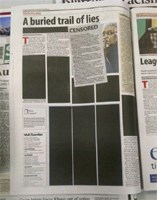
Top stories






More news


Marketing & Media
Ads are coming to AI. Does that really have to be such a bad thing?














SANEF has been one of several bodies lobbying for the inclusion of a provision in the 'Secrecy Bill' for a public interest defence in the case of the publication of state secrets, which would enable a journalist, whistle-blower or citizen who disclosed classified information, if charged, to enter a defence plea of publication in the public interest.
SANEF had issued a press statement on Thursday 17 November voicing its concern at the manner in which state security minister Siyabonga Cwele "has shut the door on the Protection of State Information Bill [POIB] being amended to include a provision for a public interest defence for the publication of state secrets."
The day before, Cwele had told the National Assembly that the ANC could not support such a defence. He stated that no other country had such a clause in similar legislation. However, according to SANEF, the minister is "quietly ignoring the fact that the United States and other countries have other mechanisms in their legislation to provide the protection sought."
Redacted parts of lead story
Then, on Friday 18 November, the Mail & Guardian redacted parts of its lead story on presidential spokesperson Mac Maharaj under threat of criminal prosecution under the National Prosecuting Authority (NPA) Act.
The Friday edition featured "a lot of black blocks and a note explaining why we had to take that route," M&G editor Nic Dawes (@NicDawes) told Bizcommunity.com. "We think the information at our disposal shows important new facts about his conduct and touches on on-going investigations - we strongly believe the public has a right to be informed."
The M&G has documents which detail financial and other conduct of Maharaj relating to the multibillion rand arms procurement deals, particularly around payments between Maharaj, Shabir Shaik and French arms company Thompson. Prior to going to publication with the information, the paper put questions to Maharaj about the answers he gave the Scorpions during the inquiry.
Presidential spokesman threatened legal action
After the presidential spokesman threatened legal action if the article went to print in its entirety, the paper then took legal advice and blacked out parts of its story on Maharaj. The NPA Act makes it an offence to disclose evidence gathered in camera by a section 28 inquiry, providing for a maximum penalty of 15 years in jail.
Maharaj released a brief statement on Thursday night accusing the paper of seeking "to hide its complicity in criminal acts by raising the spectre of a threat to media freedom and invoking fears of censorship".
In further developments, Maharaj issued a statement on Saturday confirming that he'd laid charges against the M&G and senior investigative reporters Sam Sole and Stefaans Brümmer, who wrote the story, "contravening the provisions of section 41(6) of the National Prosecuting Act of 1998," read the statement.
The Sunday Times yesterday published a story alleging that Maharaj and his wife, Zarina, had received bribes to the tune of R2.3million from French arms company, Thales. It reported that it had obtained a consultancy agreement between Thales and a company called Minderley Investments, owned by Schabir Shaik.
"Documents from the Swiss district attorney's office, which obtained court orders for statements of Zarina and Shaik's Swiss bank accounts, show Shaik's company was used as a conduit to channel the Thales money to Zarina's accounts," the article reads.
"Sunday Times accused of not printing response in full"
In response to these allegations, Maharaj then accused the Sunday Times of not printing his three-sentence response in full, despite publishing an extensive two-page report. He said that the paper has instead selected parts of his response for publication and this had consciously limited the public's awareness of what he had said.
According to Maharaj's statement, "The fact that the Scorpions did not bring any charges against either of us should make you alive to the fact that the reported insinuations and allegations of unlawful conduct by us implied in your questions may once again result in, and subject us to character assassination and trial by media consciously making use of selective information only."
He went on to say that the issues at hand belonged to matters that were investigated by the Scorpions, and that neither he nor his wife were prepared to subject themselves to a separate and additional investigation by a member of the media based on "isolated aspects of a comprehensive investigation conducted by institutions established and empowered by law to do so."
Yesterday, the Democratic Alliance (DA) called on president Jacob Zuma to suspend Maharaj without delay. DA transport spokesperson Stuart Farrow said that he would ask the public protector to investigate the allegations (in the meantime, Madonsela has already confirmed that she has set up a team to investigate POIB concerns, reports Eyewitness News).
Interests of transparency
When asked whether it would not have been better in the interests of transparency to allow the M&G to publish the article, Maharaj did not respond to Bizcommunity, instead choosing to reissue his press statement of Thursday through his researcher Conrad Ndlovu.
Dawes says that Maharaj is simply trying to find out who the M&G's sources are: "He wants to know how much information we have about the serious allegations against him that were raised in investigations flowing from the arms deal and he's trying to abuse the resources of the police and the state in general to secure that information and to distract the public from the questions he ought to be answering."
Dawes went on to say that he hoped that NPA director, Menzi Simelane, will demonstrate government's professed commitment to transparency.
"The two issues are not related"
When approached for comment, Thabo Masebe, spokesperson to deputy president Kgalema Motlanthe, told Bizcommunity that "the Protection of Information Bill is still a bill that is still in Parliament - we're not going to comment until the end of the process, which will be when the bill is passed by both houses. The two issues [POIB and Mac vs M&G] are not related. The Protection of Information Bill is still draft legislation, so there's no basis to compare it with an existing act such as the NPA Act."
Dr Ivor Sarakinsky, who teaches public governance at the school of Public and Development Management, Wits University, says this is about balancing the public interest with the rights of the individuals who have given the National Prosecuting Authority information on the basis of protected privilege. "If this is the law which Parliament has signed off on, it's binding until it is changed. This is not about arbitrary decision-making."
Sarakinsky says that there are steps that can be taken, including obtaining the public protector's consent to make the information public, and appealing to the Constitutional Court on the basis of the access to information should that fail. "If the media doesn't comply with these rules, they could actually contribute to the undermining of governance," says Sarakinsky.
Right2Know national coordinator Murray Hunter says that the NPA Act gives extraordinary powers for Government to shut off the work of the prosecuting authority from public scrutiny. "It's a symbol of the existing climate of secrecy in government - secrecy above and beyond the Secrecy Bill," he says.
Shows how much appetite there is
According to Murray, the actions taken against the M&G yesterday also show how much appetite there is for politicians to use the full might of draconian laws to clamp down on critical voices. "This is exactly why we need to guard against the powers doled out by the Secrecy Bill. The powerful already harbour too many secrets," he says.
This is a low point in the exercise of media freedom in South Africa, says SANEF chairperson Mondli Makhanya. "As the spokesperson for the presidency, Maharaj is meant to facilitate the flow of information, not act as a blocker of information.
"He holds a high office, so we need to know who he is. The information he sought to block is related directly to his actions when he was minister of transport. If he had nothing to hide, why would he seek to block the publication of that information?"
Dario Milo, partner in the Media and Constitutional law unit at Webber Wentzel and attorney for the M&G, says that the saga illustrates the "powerful chilling effect that a criminal prohibition on publication can have on a story of manifest public interest. It also illustrates why a public interest defence is so important in legislation like the NPA Act and, of course, the Protection of State Information Bill."
According to Milo, Section 41(6) contains the prohibition on disclosure of a section 28 record. "Section 41(6) is an infringement of section 16 of the Constitution because it imposes a prior restraint on publication." He says that the constitutionality of the prior restraint will need to be tested in court.
The South African twittersphere was rife with comments after Dawes tweeted on Thursday, "Just learned that the NPA act has sections as bad as #secrecybill. Your M&G will look butchered tomorrow. Blame Mac Maharaj."
Once the M&G had been published, Media Tenor SA Wadim Schreiner tweeted on Friday, "Am all 4 #zamediafreedom, but the M&G r whiners. Mac did not censor u, u censored yourself. Cheap sensationalism. Boohoo."
Schreiner says that, although he is in full support of the Right2Know campaign, and SANEF's position on the Secrecy Bill, Maharaj did not 'clamp down' on critical voices. "He simply raised his objection, albeit legal. The [M&G's] decision not to publish was based on the legal threat, and not a legal act. Politicians, just like any other people, have a right to defend themselves," says Schreiner.
Schreiner says that reaction by the M&G and some of the commentators has bordered on sensationalism.
"It seems to me that the particular issue [Maharaj/M&G] is not actually about the particular case, but more a way to highlight the potential danger of the Protection of Information Act and the Secrecy Bill. Of this I am highly supportive, but to use the Maharaj case is a bit of a simple analogy," says Schreiner.Disclosure: Roshila Jarosz is the sister of Verashni Pillay, columnist and deputy editor of the Mail & Guardian Online. She also used to write for the Mail & Guardian.
For more:
